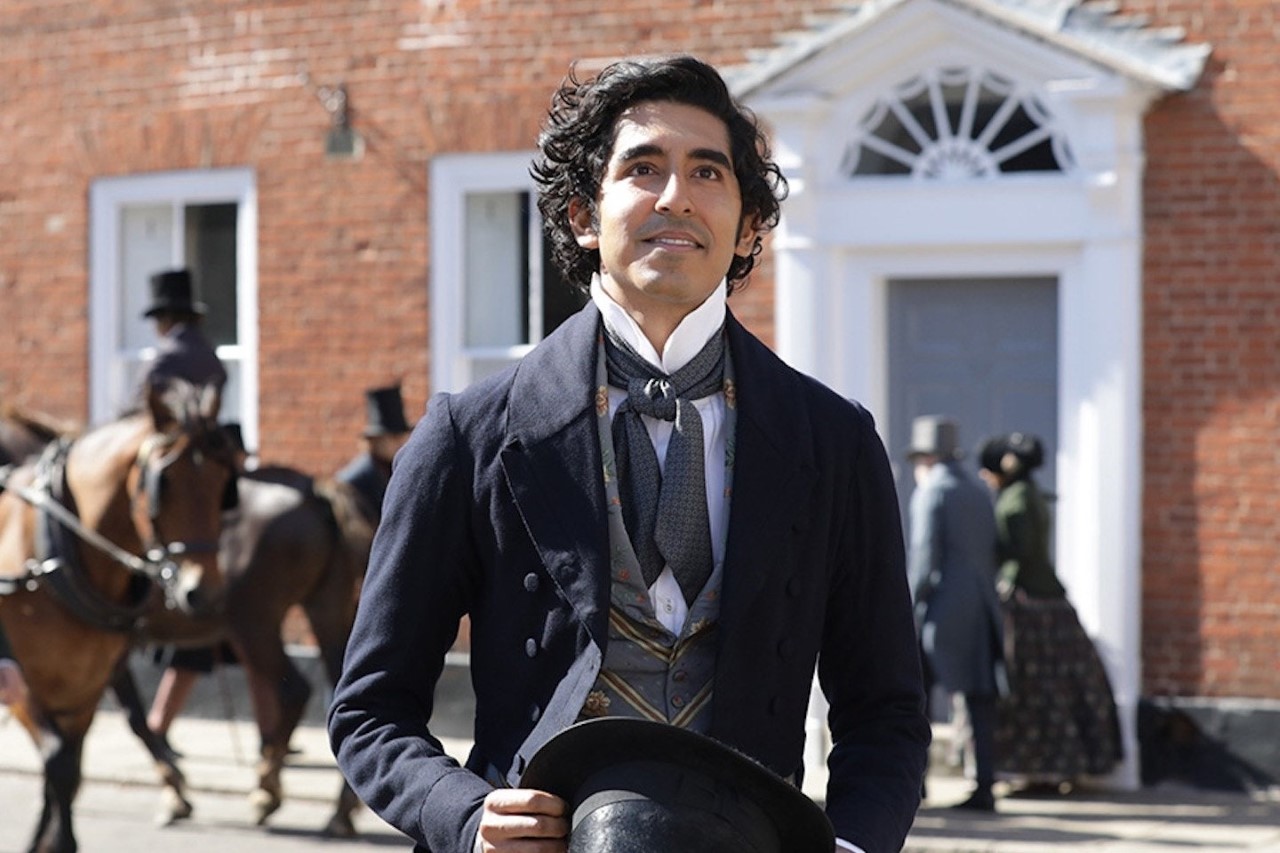Image description: Dev Patel as David Copperfield is captured in a mid-shot still, wearing traditional ninteenth-century dress, holding his hat in his hand. He stands in a suburban street, with horse-drawn carts and pedestrians visible in the background. He looks above the camera, and smiles wistfully.
By Rachel Denham-White
Charles Dickens’ iconic story has received a stylish update. This new iteration of the classic coming-of-age narrative is directed by Armando Iannucci, (The Thick of It, The Death of Stalin), and stars Tilda Swinton, Hugh Laurie, Peter Capaldi, Morfydd Clarke, and Dev Patel as the titular role.
We begin with Copperfield standing on a theatre stage, telling his story to an auditorium of rapt patrons; a clever visual link to Dickens’ famous recitals. Almost instantly, Iannucci’s unique style of directing is revealed, as Copperfield steps through the theatre backdrop and into the story, visiting his pregnant mother and interacting with his younger self. For the next few hours, we follow Copperfield on his adventures, and meet a series of eccentric and outrageous characters along the way.
The film isn’t an accurate adaptation of Dickens’ originally serialized novel; it does take liberties and significantly changes the story. Dickens purists may find it immature and revisionist for the sake of being funny, and… yeah, it is. But there is still a tremendous amount of respect for the material, and a true sense of respect for the author.
The Personal History of David Copperfield is a tale of many things. It weaves stories of coming of age, overcoming class adversity, rags to riches and back to rags again. But at its core, it is the tale of a struggling artist trying to find his identity.
Harsh moments in David’s childhood evoke Dickens’ own poverty-stricken beginnings in a shoe-blacking factory. David’s love for writing and his need to capture the eccentricities of the people around him links to Dickens’ own incredible characterisation of the people present in his life. The themes of finding and defining oneself within one’s own narrative make up the backbone of this truly heart-warming journey.
This film is charming. Yes, the plot does acknowledge the darker moments of Copperfield’s history, but the tone is uplifting and cheerful from the very first scene. The colours leap off the screen; David’s childhood is infused with pastoral light and perpetual sunshine, the grimy streets of London contrasting beautifully with the jewel-bright tones of the idyllic English countryside. The period costumes and settings are sumptuously detailed; even Mr. Micawber’s bare rented rooms have character.
The cinematography by Zac Nicholson is just as vibrant. The style is innovative and theatrical. Typical tropes such as flashbacks and visual text on the screen, are treated in new and exciting ways, making this film so much fun to watch.
The acting is absolutely incredible, and with such a grand line-up of British stars, I would expect no less. Dev Patel as David Copperfield has to play a wide variety of personas, from a vulnerable youth to a devoted lover, but Patel proves his talent as one of the best young actors of our generation. His comedy is a standout in a film full of comedic characters; his performance is infused with a gawky confidence that is hilarious to watch. As the story continues, Copperfield’s compelling struggle with uncertainty, pathos and regret make this one of Patel’s best and most nuanced performances to date.
Even though I am content to sing its praises, the film is not perfect. Iannucci is trying to condense a very long book into an average length movie, so the pacing feels very rushed. The story does jump around a lot, meaning we don’t have a lot of time to explore the gorgeous environments before we move on to the next location. Plus, there are so many characters that not everyone has the right amount of screen time. Rosalind Eleazar as Agnes Wickfield was sharp talking, witty and enjoyable, but I wish we had gotten to know her better by the end.
However, my biggest issue with this film is the casting of one certain character. Morfydd Clarke plays Dora Spenlow; a beautiful, innocent, childish young woman who holds the key to Copperfield’s heart. She is a prime example of how the film has changed the original novel, modernising the story to best connect with its target audience. To quote Mirium Margolyes, I’m a little sick of the “tiny, little, prepubescent, mini-breasted, child love-object,” that is the typical Dickens heroine.
In this version, depicting Dora as a vapid fool was a refreshing update. However, Clarke is also cast as Clara Copperfield, David’s mother. Maybe I’m reading too much into it, but seeing the budding romance between Copperfield and Spenlow suddenly became very unsettling. I have no idea what inspired this choice, but the Freudian overtones are off the charts.
Despite the problems I have with certain parts of the film, Personal History is an absolute joy to watch. The visual storytelling is clever and engaging, the comedy is top-notch, and while the colour-blind casting was definitely the talking point of this film’s release, all the actors are doing an absolutely splendid job.
Verdict: 4.5/5
Image courtesy of Film Nation Entertainment

